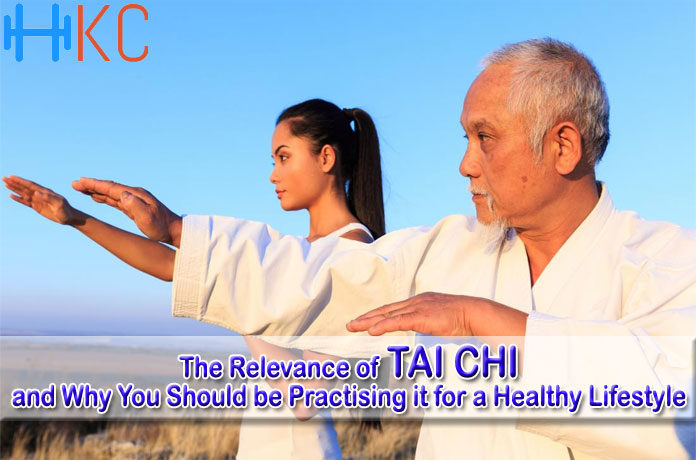Martial arts have been misinterpreted for decades now. The idea that all forms of martial arts are entirely for the purpose of combat is preposterous. The fact is ancient Chinese developed martial arts entirely for the purpose of maintaining a healthy body. These, however, were later used for combat purpose or self-defence. Such practises grew with time and resulted in what we are familiar with today.
One such form of martial arts is the “Tai-Chi.” Tai Chi is a non-competitive form of martial arts that has its core principles embedded in assuring health benefits. Luckily enough Tai Chi has gained enormous popularity in recent years for all the right reasons. Its health benefits have been proved over and over again by different researchers. As a result, more people are starting to reap its benefits. But, the fact is that the ratio of people practising it to that of their counterparts is still minimal. It, therefore, becomes a vital factor to spread the relevance of Tai Chi and its positive impact on our health.
Origin of Tai Chi
The origin of Tai Chi can be traced back as far as 700 years ago, and some even believe their existence to be 1500 years old. Its creation is mainly attributed to a Taoist Monk called Zhang San Feng. The original name of Tai Chi was “Tai Ji Quan”, and it was known popularly for its “greater longevity” aspect since its inception.
Taiji or Taichi derives its principles from the forces of “yin and yang.” Ying and Yang symbol is something that most people associate martial arts with. According to ancient Chinese scripts, the yin and yang philosophy refers to the relationship between good and evil – the dependency of opposite forces to one another in order to exist.
Tai chi or taiji in Chinese literature means “supreme ultimate,” and this is represented by combining yin and yang onto a single symbol. This translates to “supreme ultimate exercise.” It combines the breathing, movements and visualisation of the entire body simultaneously to promote a feeling of self-awareness. Taijichuan training technique mainly consists of 5 different elements: Taolu, qigong, neigong, tuishou, and Sanshou. But, the main element that Tai Chi uses is the “qigiong.” Qigong refers to the movement, breathing, meditation, and awareness exercise.
Tai Chi in its traditional form focused only little to the entire well being of the body. It was only after the combination of the traditional Taiji technique to the natural movement using breathing and relaxation method that it provided effective results. This is the form that most Tai Chi institutes practices today.
Is Tai Chi Effective? Does it Really Work?
So, enough of all the origins and its root principles, but does it actually work? There have been mixed reviews or opinions over it for many years now. But, its positive impact on our health has been proven by different institutes and different researchers. Maybe inefficient trainers play a major role in its efficiency. Many experienced Tai Chi trainers have helped their “students” harness its positive health benefits.
There are in fact many proven results from professionals that strongly support its positive effects. Dr Michael Irwin, a behavioural sciences professor at UCLA, has stated that People who practised Tai Chi experienced improvements in their vaccine response as well as immunity to viruses. In his recent 15 years of studies, he has linked and published many studies stating the effectiveness of Tai Chi practises with the improvements of various health issues such as depression, insomnia, inflammation and various other illnesses.
Tai Chi has been proved to produce the same health benefits to that of the people who practice jogging daily. A study that was published in the American Journal of Epidemiology concluded that Tai Chi had nearly the same effect as jogging in prolonging the lifespan in men. Another article in PLOS One stated that Tai Chi was highly effective in promoting and improving the endurance, fitness and overall health of our heart and lungs.
But, logically how can a simple and slow movement exercise produce such significant results? According to Dr Irwin, the effectiveness of Tai Chi’s exercise technique lies in its physical activity component. The meditative and mindful quality of Tai Chi makes it such a compelling and effective technique. Tai Chi, in particular, has proven to be much effective for sick or older adults. Its slow movement and low-intensity exercises provide an excellent method for those people who can’t perform vigorous physical exercises.
4 Proven Health Benefits of Tai Chi
1. Reduces the risk of falling
There is strong medical evidence that supports the claim that Tai Chi is effective in reducing the risks of falling in older adults. A review conducted in 2012 on 159 controlled trials showed positive results to support that practising Tai Chi regularly, in fact, reduced the chances of falls in older adults. The study consisted of more than 79,193 people.
A systematic review conducted in 2015 consisted of more than 554 participants. The participants were all Tai Chi practitioners, and the study revealed that Tai Chi significantly improved their control balance, hence, decreasing the risk of falling. It also showed that it affected their body flexibility positively.
2. Reduces Chronic pain
Several tests and studies suggest that Tai Chi is effective in relieving many types of chronic pain that results due to some specific medical conditions such as knee osteoarthritis or fibromyalgia.
A meta-analysis conducted in 2013 consisting of 7 different trials concluded the positive effect of practising Tai Chi for a duration of 12 months. The end results were more than convincing to support the reduction of pain caused by knee osteoarthritis and other chronic pain related sources.
A study conducted in 2012 on 101 people also proved that combining mindfulness training with Tai Chi significantly improved the symptoms of fibromyalgia and other pain-causing health difficulties.
3. Improves Chronic Heart Failure
There are significant results that prove that Tai Chi is highly effective in decreasing the chances of Heart failure. A systematic review of 20 different studies published in 2015 concluded that Tai Chi had significant positive results on the Cardio Vascular health. This included improvements in heart rate and blood pressure. However, these results were of minimal magnitude and gained little attention.
Another small study in the form of Cochrane review conducted on 13 small trials shows some significant result to support the evidence of Tai Chi in preventing cardiovascular diseases.
4. Improves mood and various other mood related conditions
Tai Chi in its core has the simple principle of keeping your mind calm. This has proven more than effective in reducing anxieties and depression symptoms. Preliminary research has proven that mindful and slow breathing exercise with low-intensity body movement helps in the improvement of our nervous system. This, in turn, promotes a positive effect on our mood-regulating hormones.
Conclusion
Tai Chi remains one of the only practical and effective forms of exercise that continues to promote positive health benefits. Luckily, there are various existing TaiChi For Health Institute that helps others to harness the positive aspects of Tai Chi in their life. Many people have already embraced Tai Chi as a way of dealing with their depression and anxiety related problems. With so many health benefits and minimal requirements (your time), it will be more than just a lucid case of ignorance if you are skipping Tai Chi knowingly.














